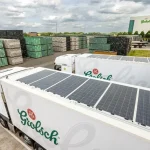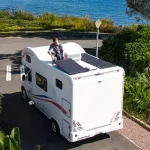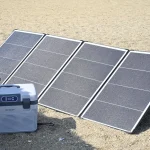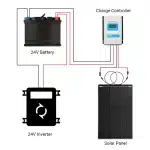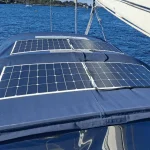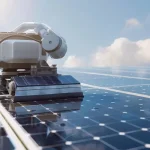When we are looking to purchase solar panels, we often come across inverters. At this point, many people might wonder: what exactly is an inverter? Do we really need to buy one? A simple explanation given is that an inverter is a dc to ac Converter. So, what are DC and AC? It’s normal not to be familiar with these concepts in our daily lives since we usually don’t need to distinguish them clearly.
A Simple Explanation:DC to AC converter
Inside appliances, there is direct current (DC), while the power lines in the grid carry alternating current (AC). We don’t notice this difference in our daily lives because the appliance plugs come with a built-in conversion function. However, if we use solar power, we need an inverter because the electricity generated by photovoltaic panels is direct current (DC), and it needs to be converted to alternating current (AC) to be fed into the grid.
Understanding Direct Current (DC)
Direct current (DC) is a type of electrical current where the flow of electric charge is unidirectional. This means that the electric charge (current) flows in a single direction. Common sources of DC include batteries, solar panels, and DC power supplies. DC is typically used in low-voltage applications and is essential for many electronic devices.
Characteristics of DC:
- Constant Direction: The current flows steadily in one direction.
- Sources: Common sources include batteries, solar panels, and DC generators.
- Applications: Widely used in electronic devices like mobile phones, laptops, and in automotive electrical systems.
- Voltage Stability: DC provides a stable voltage, making it suitable for sensitive electronic circuits.
- Transmission: Generally used for short-distance transmission due to higher energy loss over long distances.
Understanding Alternating Current (AC)
Alternating current (AC) is a type of electrical current where the direction of the electric charge flow periodically reverses. In most household and industrial applications, AC is the standard because it can be easily transformed to different voltages using transformers, making it highly efficient for long-distance transmission.
Characteristics of AC:
- Periodic Reversal: The current direction reverses periodically, typically in a sinusoidal waveform.
- Sources: AC is primarily generated by power plants and is the standard for grid electricity.
- Applications: Used in homes, businesses, and industrial settings to power appliances, machinery, and lighting.
- Frequency: The frequency of AC varies by region (e.g., 60 Hz in North America and 50 Hz in many other parts of the world).
- Transmission Efficiency: AC is more efficient for long-distance transmission due to the ability to use high-voltage lines.
The Role of Inverters
Inverters play a crucial role in solar power systems by converting the DC electricity produced by solar panels into AC electricity, which can be used by household appliances and fed into the electrical grid.

Why You Need an Inverter:
- Compatibility: Most household appliances and the electrical grid operate on AC, so the DC generated by solar panels must be converted.
- Efficiency: Modern inverters are highly efficient, ensuring that minimal energy is lost during the conversion process.
- Grid Integration: Inverters are essential for grid-tied solar systems, enabling the smooth integration of solar power into the existing electrical grid.
Types of Inverters
Choosing the right inverter depends on your specific needs and the setup of your solar power system. Here are the main types of inverters:
- String Inverters:
- Description: Connects a series of solar panels (a string) to one inverter.
- Advantages: Cost-effective and simple to install.
- Disadvantages: Performance can be affected if one panel in the string is shaded or malfunctioning.
- Microinverters:
- Description: Each solar panel has its own microinverter.
- Advantages: Maximizes the output of each panel independently, ideal for installations where shading or orientation issues are present.
- Disadvantages: Higher initial cost compared to string inverters.
- Hybrid Inverters:
- Description: Combines features of string inverters with battery storage capabilities.
- Advantages: Supports energy storage systems, allowing for greater energy independence and backup power.
- Disadvantages: More complex and expensive than traditional string inverters.
- Central Inverters:
- Description: Used for large-scale solar installations, centralizing the conversion process.
- Advantages: Suitable for large solar farms and commercial applications.
- Disadvantages: Not practical for residential use due to size and cost.
Choosing the Right Inverter
When selecting an inverter, consider the following factors:
- System Size and Design: The type and size of your solar power system will influence your choice of inverter. For residential systems, string inverters and microinverters are common, while larger commercial systems may require central inverters.
- Shading and Orientation: If your solar panels are subject to shading or are installed at different orientations, microinverters or power optimizers (used with string inverters) may be the best option to maximize performance.
- Budget: Your budget will play a significant role in your choice. String inverters are generally more affordable, while microinverters and hybrid inverters offer additional benefits at a higher cost.
- Future Expansion: If you plan to expand your solar power system or add battery storage in the future, consider an inverter that can accommodate these changes, such as a hybrid inverter.
In conclusion, understanding the basics of direct current and alternating current, and the role of inverters in solar power systems, is crucial for making informed decisions when setting up your solar energy solution. By carefully considering your specific needs and the characteristics of different inverter types, you can select the best inverter to ensure optimal performance and efficiency of your solar power system.


